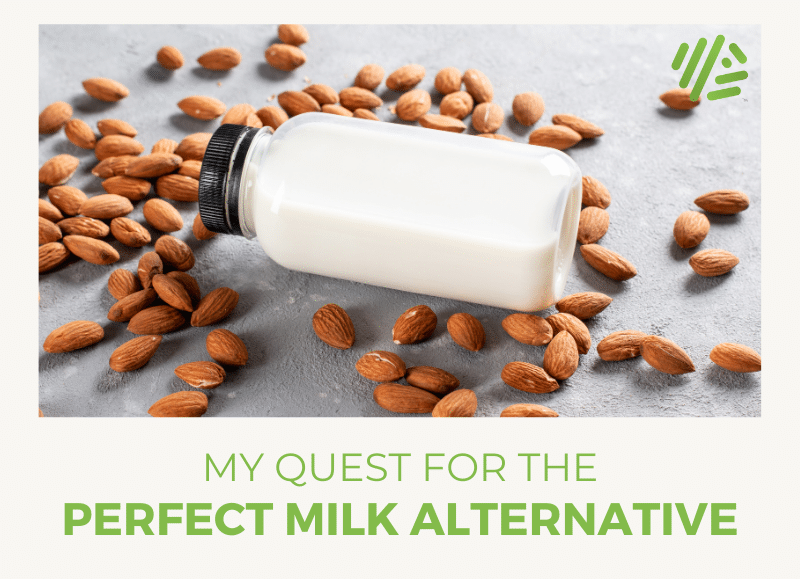Avoid These 5 Ingredients in Plant-Based Milks
Article at a Glance
- Sensitivity to dairy and lactose intolerance have been driving the rise of many plant-based alternative milks, such as soy, coconut and almond milk.
- Many plant-based milks carry with them hidden additives and, in some cases, the possibility for trace amounts of pesticides.
- Simple coconut milk and Elmhurst Milked Almonds are two of the cleanest alternative milks we could find.
- In many cases, it may be easier and healthier to just make plant-based milk at home.

Contents
Whether you’re opting out of dairy completely or just looking for a good alternative from time to time, the choices, from oat to soy to macadamia, can be overwhelming.
Strolling down the milk alternatives aisle at any grocery store will bombard you with different varieties and flavors. Above all else, you’ll be inundated with health claims and clever marketing catchphrases. Don’t let this “green-washing” fool you — not all milk alternatives are created equal, and some are downright unhealthy.
Plant-based milk?
There’s been an ongoing debate on whether or not plant-based milks actually deserve the title of “milk.” In fact, it has been the center of controversy for quite some time.
This controversy led the Food and Drug Administration (FDA) to conduct a study of public opinion. A few years ago, the FDA solicited public comment on whether or not regulation should be imposed on the use of terms normally used by dairy, like milk, yogurt, and cheese. To date, the FDA has not released an official decision.
Many producers opt out of this fight and don’t use the word “milk.” Instead, they use a spin on the name, like “Milked Almonds” from Elmhurst.
Benefits of choosing plant-based milk
First, let’s talk about why you might want to stray from animal-based milks. Obviously, the answer is clear if you have a sensitivity or allergy to milk or are lactose intolerant, which is something that is usually visible through genetic testing. For these sensitive individuals, dairy products can wreak havoc on their immune and gastrointestinal systems. This makes the choice to switch to plant-based milk easy.
But there is a gray area for some people who aren’t dealing with allergies or tested food sensitivities, but still find a benefit from cutting out or reducing their dairy intake. For these people, taking advantage of the plethora of available plant-based milks could provide health benefits.
Shifting to a more plant-based has been shown to have health benefits for some people.
Let’s also look outside our own bodies, and into the effects that different production practices have on the environment around us. Meat farming and dairy practices take a heavy toll on the land and use an incredible amount of natural resources. One study showed that dairy milk uses almost nine times more land resources to produce than plant-based counterparts.1 By choosing plant-based sometimes or all the time, you can help reduce the carbon footprint these practices leave behind.
Popular types of plant-based milk
Different plant-based milk varieties offer different flavors, consistencies, and qualities. There are essentially 5 categories of plant-based milks, as outlined below:
- Cereal-based – oat, rice, corn, spelt
- Legume-based – soy, peanut, peas
- Nut-based – almond, coconut, cashew, macadamia nut, hazelnut, pistachio, walnut
- Seed based – sesame, flax, hemp, sunflower
- Pseudo-cereal based – quinoa, teff, amaranth
With such a variety of sources, it’s no wonder the nutritional value, consistency, and flavor can be so variable.
Plant-based-milk additives to avoid
The base of your plant-based milk is only the first thing to consider. The complications come from the possibility of preservatives and additives that may cause inflammation or GI issues in your body.
Because plant-based milk companies are trying to appeal to dairy consumers, they turn to emulsifiers to replicate the coveted creamy texture found in real milk. Adding emulsifiers also helps keep the plant-based milks shelf stable, which is why you’ll find many of them on the shelves rather than in the refrigerator at the grocery store. Some additives you might find when peeking at a plant-based milk label include carrageenan, xanthan gum, and guar gum.
#1. Carrageenan
Carrageenan is one of the more popular additives. It does a wonderful job of thickening and stabilizing the milk, creating a creamy texture. However, it also has a dark side. For decades, it has been the subject of controversy for its short and long term effects on human health. Some studies have demonstrated that it promotes inflammation. It has also been shown to be harmful to the gastrointestinal tract. 2
#2. Guar and Xantham Gum
The gums, including xanthan gum and guar gum, are also great at stabilizing and thickening plant-based milks. Xanthan gum is the product of bacterial fermentation. Often, it is derived from common allergens, including wheat, corn, and soy. This can be a concern for those who have food allergies or food sensitivities. Xanthan gum has also been studied for its effects on the gastrointestinal tract. It has been shown to promote irritation and alter gut bacteria.3
While Xanthan gum can be derived from wheat, corn, or soy, guar gum gets its name from its source — guar beans. Guar beans are a type of legume that has also been — you guessed it — linked to digestive issues. Some of the gastrointestinal effects that have been observed from the consumption of guar gum include gas and bloating. Guar gum has also been shown to have traces of soy, which could be a problem for those with sensitivities. Guar gum is a member of the long list of items that were deemed safe for weight loss in the 1990’s. It has the ability to mimic satiety, which in turn leads to less calorie consumption. It’s no wonder it was such a hit in the diet pill industry. The large amount of guar gum that was found in weight loss products may have led to weight loss, but it also let to esophageal and small bowel obstruction. 4 These complications ultimately led the FDA to ban guar gum in weight loss products.
#3. Added sugar
In addition to these emulsifiers, added sugar is a big issue when evaluating plant-based milks. Perusing the grocery store, you may notice the increasing number of flavors for plant-based milks. Added sugar almost always joins these added flavors. That’s why we encourage you to opt for the plain, unsweetened version of your favorite plant-based milks.
#4. Soy and Sunflower Lecithin
Lecithins are also a common food additive used as an emulsifier. As I’ve touched on already, if you’re sensitive to soy, soy lecithin may present problems for you even though many people do just fine with the small amounts of lecithin found in plant milks. Having said that, it is worth noting that most soy lecithin will have been made using GMO soybeans and a hexane extraction process. The GMO issue is of particularly relevant because of the fact that genetically modified crops are designed to be resistant to pesticides, like glyphosate. This means they are sprayed with glyphosate, and we know trace amounts then end up in our food. Additionally, a study that appeared a few years back in the New England Journal of Medicine showed that lecithin can raise levels of TMAO, a gut metabolite linked to heart disease.
Why organic plant-based milk might be a better choice
Just as you would consider the growing practices of the produce section, you have to also consider the growing practices when it comes to plant-based milks. If pesticides are used in growing practices, they are likely to end up in your glass of plant-based milks.
For example, the Environmental Working Group recently conducted a study, finding traces of glyphosate, otherwise known as Monstanto’s RoundUp herbicide, in many popular cereal brands. Specifically, they found a high concentration in oats. So this would be a concern when choosing oat milk. This is why we encourage you to always choose organic when possible.
My go to plant-based milks
My favorite plant-based milk varies depending on the application. For baking, I absolutely love coconut milk. The high fat content and subtly sweet, nutty flavor are perfect for baked goods. Most coconut milk you’ll find on the shelves contains guar gum, but one shining example of healthy production stands out at Native Forest. They offer a variety without the guar gum for people who may be sensitive. They’ve dubbed this variety the simple coconut milk and the ingredients are as simple as it gets — organic coconut milk. I’ve used it in everything from muffins to curries, and it never disappoints.
The ultimate test for me in the quality of flavor of a plant-based milk is the ability to truly enjoy a glass of it straight up. While I love coconut milk for cooking and baking, it’s not something I want to sip a cold glass of. For that, Elmhurst Milked Almonds is by far a favorite. It tastes great and it’s ingredient list is super simple too — almonds and water. They use a new technology to extract the almond milk which results in a ridiculously creamy milk with a mild flavor. The best part — no added anything!
Make your own plant-based milk
Your best bet? Make your own plant-based milk at home. I know it may seem complicated, but you can make it in less time than it would take you to park at the grocery store. Some recipes are literally as easy as turning on your blender. Once you see how incredibly simple it can be to make your own plant-based milk, free of preservatives, added sugars, and other additives, you may never go back!




In both places where you linked “Simple coconut milk” and “Elmhurst Milked Almonds,” the underlying URL is the same. That is, clicking on eiither brings the user to the same Amazon page for the “Simple coconut milk.” There is no link to the actual “Elmhurst Milked Almonds” product. Just FYI.